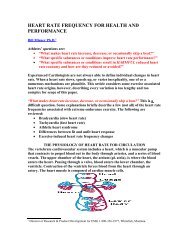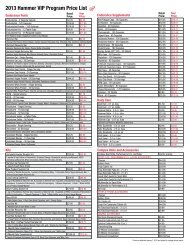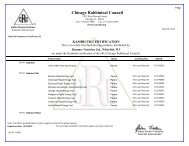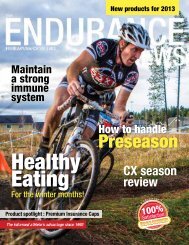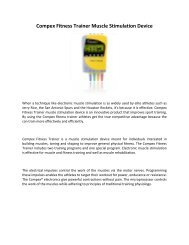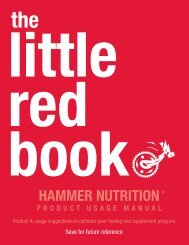Fueling For Motocross Success - Hammer Nutrition
Fueling For Motocross Success - Hammer Nutrition
Fueling For Motocross Success - Hammer Nutrition
Create successful ePaper yourself
Turn your PDF publications into a flip-book with our unique Google optimized e-Paper software.
RECOVERY – Do It Right and Reap the Rewards<br />
Most of the time the first thing we want to do after a tough workout is get out of our dirty, sweaty workout gear and<br />
take a shower. After that, the next thing we usually end up doing is heading straight for the couch for some well-earned<br />
R&R. Does that scenario sound familiar to you too If so, you’re not alone but in all honesty it’s not the best thing you<br />
can do to get the most out of your workouts and “prep” your body for your upcoming races. In fact, I believe that one<br />
of the areas that athletes tend to neglect the most is in regards to recovery, specifically the refueling of the body as soon<br />
as possible after each and every workout.<br />
Are you guilty of this as well If so, that’s really unfortunate because it’s absolutely one of the most important things<br />
that you can do to improve your chances of success come race day. In fact, I honestly believe that properly refueling<br />
your body immediately after all your training sessions is as important as anything you did in the actual workout. When<br />
you give your body what it needs as soon as possible after exercise (and that means before hitting the shower and<br />
before getting horizontal on the sofa) it will respond wonderfully and you’ll benefit tremendously. You recover and<br />
rebuild faster, and your body is able to store more and more of a premium, ready-to-use fuel known as muscle<br />
glycogen. The bottom line is that you can really give yourself a major advantage come race day if you’ll take the time<br />
to put some quality fuel back in your body as soon as possible after all your workouts leading up to the race.<br />
If you’re at all serious about performing better in your racing AND staying healthier, here’s a saying you need to live<br />
by – “Once you’ve finished training, you’re still not finished training!” Here’s what I mean: You’ve got to pay as<br />
much attention to recovery as you do to your workout if you expect to reap the benefits of hard training. In other words,<br />
how well you recover today will be a huge factor in how well you perform tomorrow.<br />
And you know what It’s really simple to maximize your recovery and reap all the rewards that come from that. Here<br />
are the two primary things you need to do:<br />
1.) Consume 30-60 grams of quality carbohydrates within the first 30 minutes after each workout<br />
2.) Consume 10-30 grams protein, preferably whey protein, during that time as well<br />
Let’s take a brief look at each of those components, beginning with carbohydrate replenishment. When you begin a<br />
workout or race the first fuel your body will use is stored carbohydrate, which is known as muscle glycogen. There is a<br />
finite amount of this premium fuel available in your body but its importance can’t be overstated. Quite simply, the<br />
athlete who has more of this readily available fuel in their body has a definite advantage and to have a good race or<br />
workout, you need to start with a full load of muscle-stored glycogen.<br />
The question is: How can you get your body to store as much of it as it possibly can The first way is through training,<br />
which increases both muscle glycogen storage capacity and how efficiently your body uses it. The second way is to<br />
replenish the body with carbohydrates as soon as possible after exercise, which is when the body is most receptive to<br />
taking those carbs, converting them into glycogen, and storing them in the muscles. Along with insulin, an enzyme<br />
known as glycogen synthase drives carbohydrates into glycogen stores and protein into muscle cells. Unfortunately, the<br />
“life span” of glycogen synthase is relatively short, peaking in the 0-30 minutes after exercise then declining<br />
substantially for the next 90 minutes. Needless to say, to store as much glycogen as possible, it’s important to take<br />
advantage of the glycogen synthase enzyme when it’s most active.<br />
Here’s why all this is so important to you as an athlete:<br />
1. The less-fit athlete, and the one who HAS NOT been putting carbohydrates back in their body shortly after<br />
exercise, has very limited amounts of muscle glycogen available, perhaps as little as 10-15 minutes worth.<br />
2. The fit athlete, and the one who HAS been consistently refueling their body with carbohydrates immediately<br />
after exercise, can build up a nice 60-90 minute reservoir of this premium, ready-to-use fuel. Which would<br />
you rather have when the gate drops – a measly 15 minutes of on-board, ready-to-use fuel or a full 90<br />
minutes worth The answer should be pretty obvious.<br />
RULE #1 – As soon as possible after you finish your workout, before you get into the<br />
shower or before you get horizontal, consume approximately 30-60 grams of high quality<br />
complex carbohydrates.<br />
Now let’s look at protein. You see, while carbohydrate intake promotes many aspects of post-exercise recovery, it can’t<br />
do the job alone; you need protein as well. The primary reason for consuming protein is that it provides the raw<br />
materials needed to rebuild stressed muscles. Protein also plays a key role in how well the body stores glycogen.<br />
Finally, protein is crucial for maintaining a strong immune system.<br />
Of all the protein sources available whey protein is considered the ideal protein for recovery. It’s the fastest acting<br />
protein source and contains the highest percentage of essential amino acids, the protein “building blocks” that your<br />
body does not manufacture and must obtain from dietary sources. Whey protein is also rich in other amino acids that<br />
have a direct impact on strengthening your immune system.<br />
So for rebuilding the muscle tissue, for maximizing how much glycogen your body can store, and to build a strong<br />
immune system don’t forget to consume protein, preferably whey protein, after your workouts.



